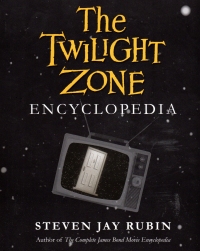 I bought this book when I saw a conservative blog I read (I forget which, but I hope it’s not the hoity-toity Ace of Spades HQ Sunday Morning Book Thread since OregonMuse posts my books) mention it and say that it was anti-Trump or something. To be honest, it’s not particularly anti-Trump: It does not mention him by name, which is refreshing in a book you’ve been told is a sucker punch hit job. It does say that The Twilight Zone told uncomfortable truths/stories (which is kind of like the Resistance, amiwrong?), but you see that sort of thing in a lot of books touting shows, both current and historical. A couple of entries have phrases of dubious provenance but that are clearly meant to refer to These Dark Times, such as mentioning jackboots returning in the 21st century and whatnot. But overall, not something that Michael Moore or–what’s that guy that was a “comedian” and then “Senator” from the state that elected that wrestler who wore feathers as governor?–would have written.
I bought this book when I saw a conservative blog I read (I forget which, but I hope it’s not the hoity-toity Ace of Spades HQ Sunday Morning Book Thread since OregonMuse posts my books) mention it and say that it was anti-Trump or something. To be honest, it’s not particularly anti-Trump: It does not mention him by name, which is refreshing in a book you’ve been told is a sucker punch hit job. It does say that The Twilight Zone told uncomfortable truths/stories (which is kind of like the Resistance, amiwrong?), but you see that sort of thing in a lot of books touting shows, both current and historical. A couple of entries have phrases of dubious provenance but that are clearly meant to refer to These Dark Times, such as mentioning jackboots returning in the 21st century and whatnot. But overall, not something that Michael Moore or–what’s that guy that was a “comedian” and then “Senator” from the state that elected that wrestler who wore feathers as governor?–would have written.
But I got it because I remember a little of the show and thought it might be interesting.
I’ll be honest; at the outset of reading this book, I could only remember one episode of the show (“A Stop At Willoughby”, which I saw sometime in adulthood, I think). As I read it, I also remember seeing “The Shelter” at some point in my youth, probably in the 1980s when another Republican was in office, and the fear of nuclear war led to great art like The Day After and Testament (not the band) as well as a whole genre of post-apocalyptic movies.
But this book is a bit of nostalgia trip in taking me back to my youth, when this program was syndicated and available for watching (although apparently I didn’t watch or remember too much) along with a lot of other old black and white programs. The book itself is entries for individual actors, actresses, producers, directors, musical composers, and other people associated with the series along with the individual episodes, themes, lots, and other markers from the series. So when running through the actors who played in this program, it listed other things they appeared in, including series like Combat!, Black Sheep Squadron, and other things that hit syndication while I was coming of television watching age and beyond. Notable actors who played in episodes of The Twilight Zone include William Shatner, Jack Klugman, Jack Warden, and others that I know mostly from other works. Still, it was a varied bunch, and their connections to old television shows that I sort of remember remind me of a time. You know.
Secondly, the list of programs that I don’t recognize humbles me a bit. I mean, many of the anthology series (Playhouse this and sponsor Theatre that) were done live, so recordings do not exist. Other shows, like Peter Gunn and so on, I recognize the names but don’t think I’ve seen. I didn’t see them on television in the day, and I’m not sure they’re easy to find on television (or other media) today. There was a whole world of television that came on before I was self aware and that I’ve never seen. Likewise, the movie credits indicate a wide world of films, including war films and detective movies, that I’ve never heard of and have never seen.
So the book rather inspired me to look for some of these things to view. And, of course, to watch the television program itself which I see is available on Blu-ray for less than $60 . So I might think about that, too.
. So I might think about that, too.
I’d say “I hope I can get some use out of this on trivia nights,” but trivia nights’ trivia tends to be more recent than this program these days.
But I enjoyed the book. And I paid full price for it and don’t regret it, which says something.
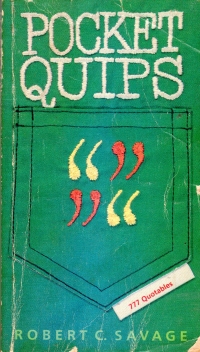 This book is a small collection of quips, anecdotes, and aphorisms collected by a pastor, presumably for sprinking in sermons and whatnot. As such, it’s chock full of faith-based meditations, brief meditations, on grace, hope, love, and morality, but it also has some secular bits, too. It’s not Poor Richard’s Almanack, but it’s not supposed to be. It’s a step up from Hallmark compilations, but that’s it.
This book is a small collection of quips, anecdotes, and aphorisms collected by a pastor, presumably for sprinking in sermons and whatnot. As such, it’s chock full of faith-based meditations, brief meditations, on grace, hope, love, and morality, but it also has some secular bits, too. It’s not Poor Richard’s Almanack, but it’s not supposed to be. It’s a step up from Hallmark compilations, but that’s it.


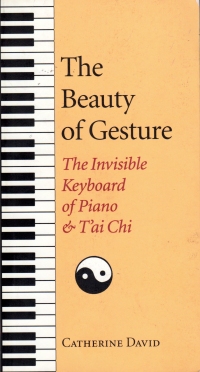 The subtitle of this book is The Invisible Keyboard of Piano and T’ai Chi, and it’s a mindful meditation on, well, being mindful. The author is an expert pianist and long time t’ai chi practitioner who explains the subtleties in each that one gains through experience and through focusing very hard on every aspect of each action involved in either. Or in everything we do. Then we can improve upon the subtleties to get closer to impossible perfection in music or kata.
The subtitle of this book is The Invisible Keyboard of Piano and T’ai Chi, and it’s a mindful meditation on, well, being mindful. The author is an expert pianist and long time t’ai chi practitioner who explains the subtleties in each that one gains through experience and through focusing very hard on every aspect of each action involved in either. Or in everything we do. Then we can improve upon the subtleties to get closer to impossible perfection in music or kata.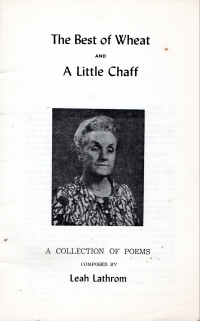
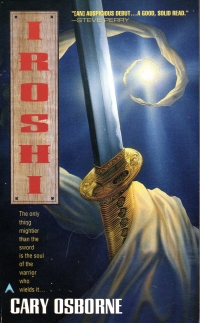 I bought this book
I bought this book 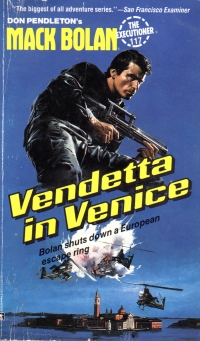 I decided to break up the serious reading with my first Mack Bolan book of the year. It’s been almost six months since
I decided to break up the serious reading with my first Mack Bolan book of the year. It’s been almost six months since 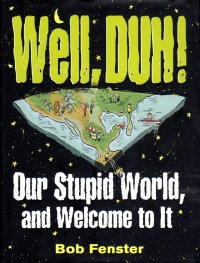 I read this Internet listicle of a book while sitting in various bleachers while my child or children practiced basketball. This has proven to be my most focused reading time of late, which is why I’ve not yet read twenty books this year, and given the locale, it’s not suited for particularly heavy reading. So Internet listicles in print fills that “I want to be reading something, but now I’m distracted” void.
I read this Internet listicle of a book while sitting in various bleachers while my child or children practiced basketball. This has proven to be my most focused reading time of late, which is why I’ve not yet read twenty books this year, and given the locale, it’s not suited for particularly heavy reading. So Internet listicles in print fills that “I want to be reading something, but now I’m distracted” void.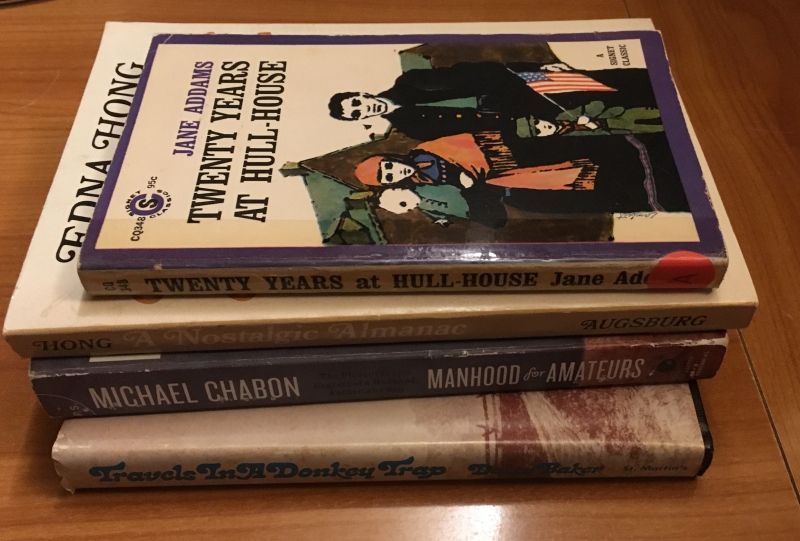
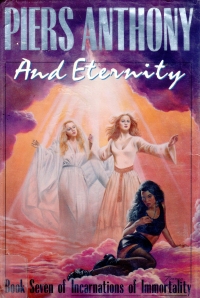 In my book report on
In my book report on 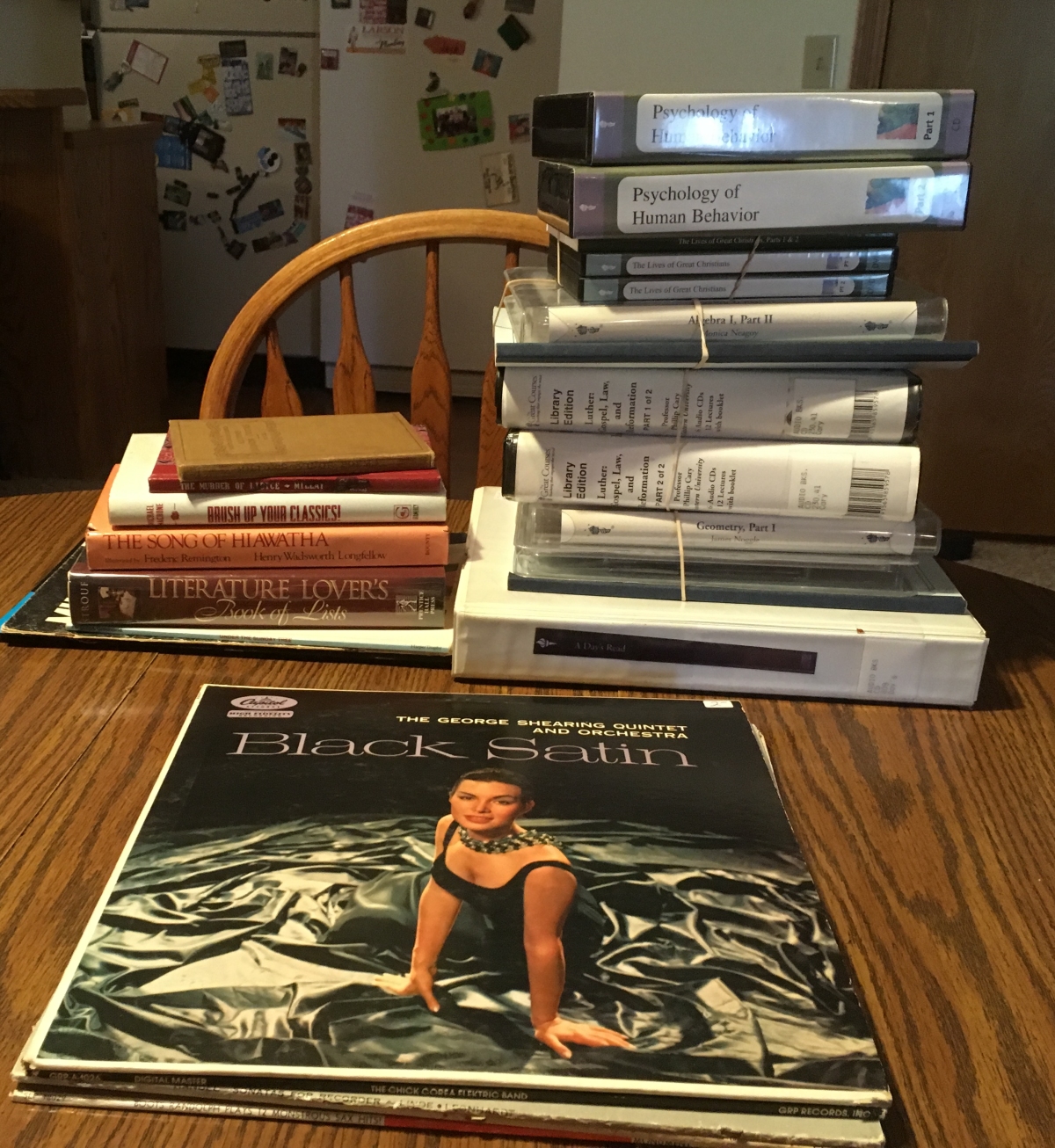
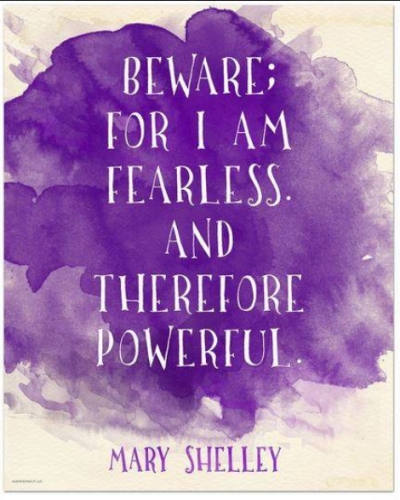
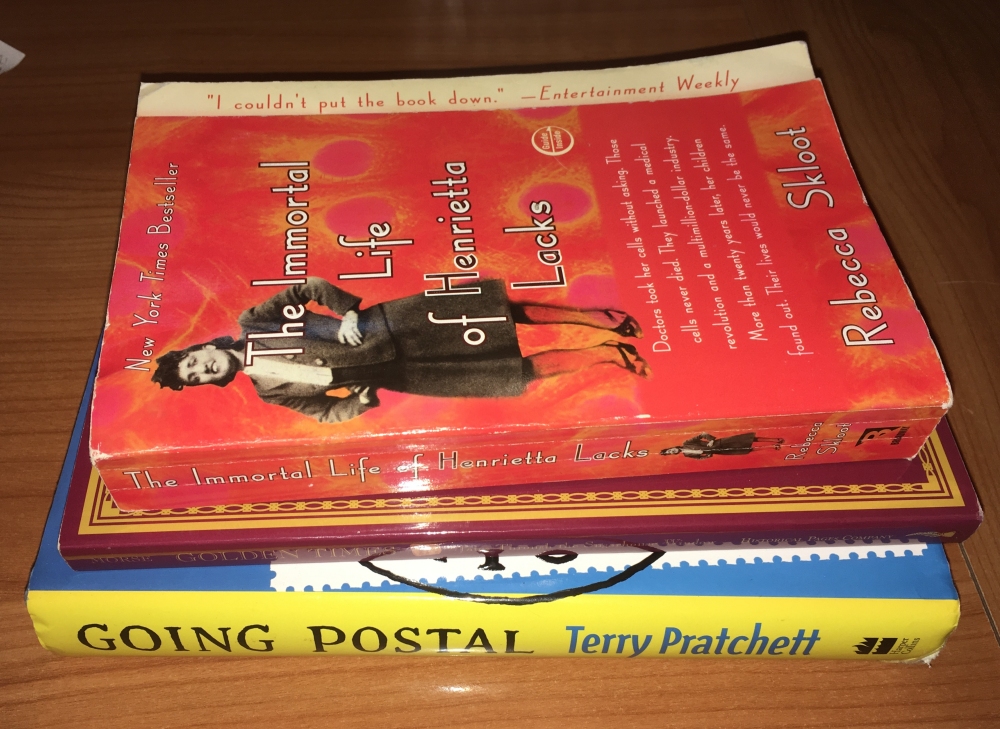
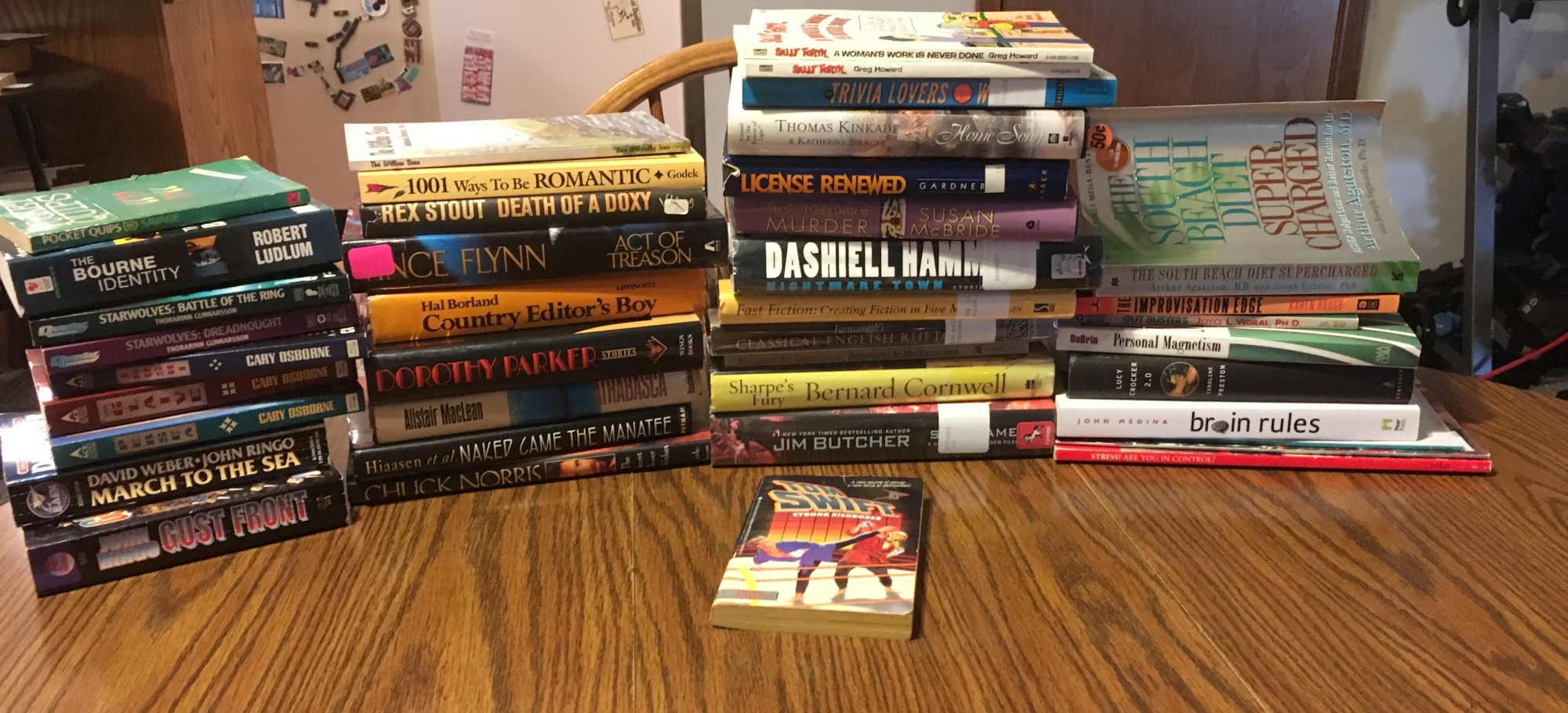
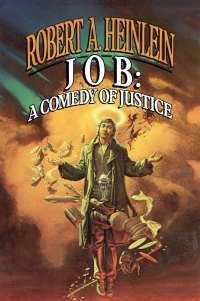 This is a later Heinlein novel. Published in 1984, it has a heft to it that the earlier rocket jockey stuff had, but it’s a bit boggy and ends less than well from my perspective.
This is a later Heinlein novel. Published in 1984, it has a heft to it that the earlier rocket jockey stuff had, but it’s a bit boggy and ends less than well from my perspective.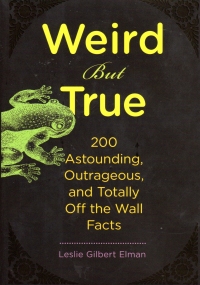 More interesting than the book itself is the way I ended up with it. I took my children to Barnes and Noble last week, as I was looking for a guided journal full of writing prompts to get me writing longer things again, and as a treat, I told them they could each spend $7. Which is enough for a magazine, but probably not enough for a great big Lego book with collectible mini figure or picture encyclopedia a la
More interesting than the book itself is the way I ended up with it. I took my children to Barnes and Noble last week, as I was looking for a guided journal full of writing prompts to get me writing longer things again, and as a treat, I told them they could each spend $7. Which is enough for a magazine, but probably not enough for a great big Lego book with collectible mini figure or picture encyclopedia a la 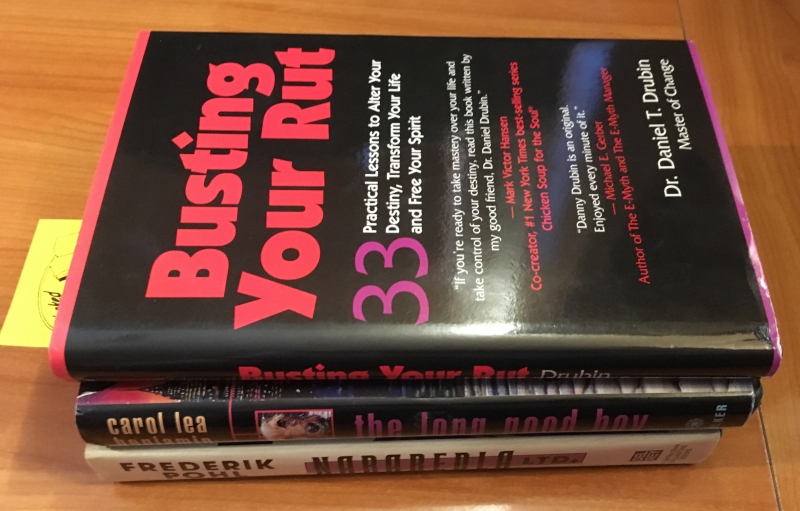
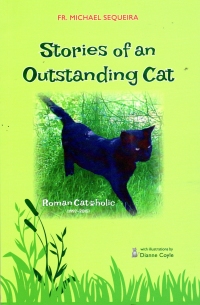 I grabbed this from the free cart at church
I grabbed this from the free cart at church  I bought this book when I saw a conservative blog I read (I forget which, but I hope it’s not the hoity-toity Ace of Spades HQ Sunday Morning Book Thread since OregonMuse posts my books) mention it and say that it was anti-Trump or something. To be honest, it’s not particularly anti-Trump: It does not mention him by name, which is refreshing in a book you’ve been told is a sucker punch hit job. It does say that The Twilight Zone told uncomfortable truths/stories (which is kind of like the Resistance, amiwrong?), but you see that sort of thing in a lot of books touting shows, both current and historical. A couple of entries have phrases of dubious provenance but that are clearly meant to refer to These Dark Times, such as mentioning jackboots returning in the 21st century and whatnot. But overall, not something that Michael Moore or–what’s that guy that was a “comedian” and then “Senator” from the state that elected that wrestler who wore feathers as governor?–would have written.
I bought this book when I saw a conservative blog I read (I forget which, but I hope it’s not the hoity-toity Ace of Spades HQ Sunday Morning Book Thread since OregonMuse posts my books) mention it and say that it was anti-Trump or something. To be honest, it’s not particularly anti-Trump: It does not mention him by name, which is refreshing in a book you’ve been told is a sucker punch hit job. It does say that The Twilight Zone told uncomfortable truths/stories (which is kind of like the Resistance, amiwrong?), but you see that sort of thing in a lot of books touting shows, both current and historical. A couple of entries have phrases of dubious provenance but that are clearly meant to refer to These Dark Times, such as mentioning jackboots returning in the 21st century and whatnot. But overall, not something that Michael Moore or–what’s that guy that was a “comedian” and then “Senator” from the state that elected that wrestler who wore feathers as governor?–would have written.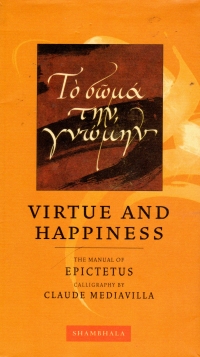 As you might recall, gentle reader, I bought this book at ABC Books last month because
As you might recall, gentle reader, I bought this book at ABC Books last month because 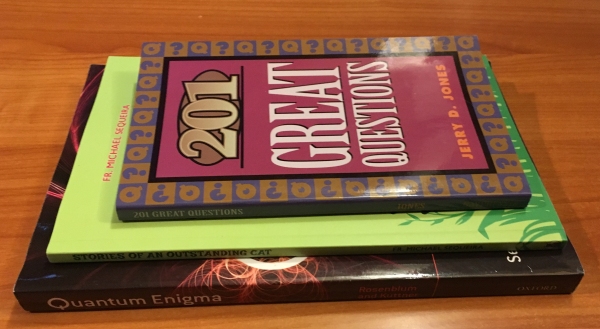
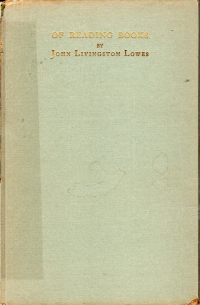 Wow, Brian J., you might ask. Didn’t you used to read books? I know I ask myself that question frequently. But my reading time was curtailed the first quarter of this year. First, I didn’t have a lot of time to read a small “carry” book that I took out with me to various locations where I’d have a half hour or hour to kill. I’ve not been going to martial arts classes enough this year so far, and when I do, it’s been on days where I’ve not had to get there for my children’s classes, where I would wait for mine to begin thirty or forty five minutes later. And instead of sitting on a bench in church on Sunday mornings during the Sunday School hour, I’ve been schlepping my laptop to a local coffee shop to try to bang out the beginnings of a novel. Also, as you might recall, I’ve been working my way through some
Wow, Brian J., you might ask. Didn’t you used to read books? I know I ask myself that question frequently. But my reading time was curtailed the first quarter of this year. First, I didn’t have a lot of time to read a small “carry” book that I took out with me to various locations where I’d have a half hour or hour to kill. I’ve not been going to martial arts classes enough this year so far, and when I do, it’s been on days where I’ve not had to get there for my children’s classes, where I would wait for mine to begin thirty or forty five minutes later. And instead of sitting on a bench in church on Sunday mornings during the Sunday School hour, I’ve been schlepping my laptop to a local coffee shop to try to bang out the beginnings of a novel. Also, as you might recall, I’ve been working my way through some